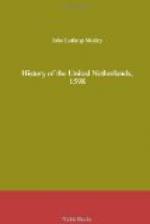It would be difficult and almost superfluous to indicate the various resources placed in the hands of this one personage, who thus controlled so large a portion of the earth. All that breathed or grew belonged to him, and most steadily was the stream of blood and treasure poured through the sieve of his perpetual war. His system was essentially a gigantic and perpetual levy of contributions in kind, and it is only in this vague and unsatisfactory manner that the revenues of his empire can be stated. A despot really keeps no accounts, nor need to do so, for he is responsible to no man for the way in which he husbands or squanders his own. Moreover, the science of statistics had not a beginning of existence in those days, and the most common facts can hardly be obtained, even by approximation. The usual standard of value, the commodity which we call money—gold or silver—is well known to be at best a fallacious guide for estimating the comparative wealth—of individuals or of nations at widely different epochs. The dollar of Philip’s day was essentially the same bit of silver that it is in our time in Spain, Naples, Rome, or America, but even should an elaborate calculation be made as to the quantity of beef, or bread or broadcloth to be obtained for that bit of silver in this or that place in the middle of the sixteenth century, the result, as compared with prices now prevalent, would show many remarkable discrepancies. Thus a bushel of wheat at Antwerp during Philip’s reign might cost a quarter of a dollar, in average years, and there have been seasons in our own time when two bushels of wheat could have been bought for a quarter of a dollar in Illinois. Yet if, notwithstanding this, we should allow a tenfold value in exchange to the dollar of Philip’s day, we should be surprised at the meagreness of his revenues, of his expenditures, and of the debts which at the close of his career brought him to bankruptcy; were the sums estimated in coin.
Thus his income was estimated by careful contemporary statesmen at what seemed to them the prodigious annual amount of sixteen millions of dollars. He carried on a vast war without interruption during the whole of his forty-three years’ reign against the most wealthy and military nations of Christendom not recognising his authority, and in so doing he is said to have expended a sum total of seven hundred millions of dollars—a statement which made men’s hair stand on their heads. Yet the American republic, during its civil war to repress the insurrection of the slaveholders, has spent nominally as large a sum as this every year; and the British Empire in time of profound peace spends half as much annually. And even if we should allow sixteen millions to have represented the value of a hundred and sixty millions—a purely arbitrary supposition—as compared with our times, what are a hundred and sixty, millions of dollars, or thirty-three millions of pounds sterling—as the whole net revenue of the greatest empire that had ever existed in the world, when compared with the accumulated treasures over which civilized and industrious countries can now dispose? Thus the power of levying men and materials in kind constituted the chief part of the royal power, and, in truth, very little revenue in money was obtained from Milan or Naples, or from any of the outlying European possessions of the crown.




